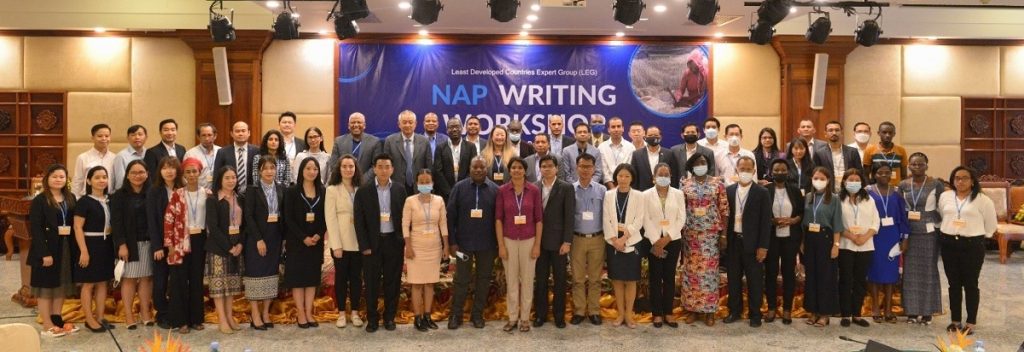Several of the world’s least developed countries have accelerated their plans to adapt to the effects of climate change thanks to a workshop held in Siem Reap, Cambodia, last week.

Almost 60 participants from various least developed countries attended a writing workshop on National Adaptation Plans (NAPs) organised by UN Climate Change’s Least Developed Countries Expert Group (LEG) and hosted by the Government of Cambodia from July 12 to 15, 2022.
Made up of countries across Africa, Asia-Pacific and the Caribbean, the 46 least developed countries have a combined population of more than one billion people, yet contribute less than 1% of global CO2 emissions.
And while they are least responsible for the climate crisis, they are most vulnerable to its impacts, such as sea-level rise, desertification, fires, floods and droughts. This is further complicated by the fact that these countries lack the financial support for measures to improve their resilience to climate change.
With this in mind, last week’s workshop, part of a series of events organised by the Expert Group, helped these countries advance their adaptation plans on all fronts – from formulating the plans to implementing the policies, projects and programmes identified in them.
In his opening remarks, the Secretary of State of the Ministry of Environment of the Government of Cambodia, Dr. Tin Ponlok, said the workshop was an excellent opportunity to share experiences, learn from best practices, identify assistance needed and make concrete progress in the development of the countries’ adaptation project pipelines.
“It is important for all of us to refine our development strategies towards a greener and more resilient approach to external economic or geopolitical shocks, especially related to food security and energy,” Ponlok said.
Paul Desanker, from the UN Climate Change secretariat, expressed appreciation to the Cambodian government for co-organising the workshop in light of the difficult circumstances presented by the Covid-19 pandemic.
“UN Climate Change supports Cambodia and other least developed countries in developing adaptive action plans and related techniques to improve people’s livelihoods and respond to climate change,” Desanker said.
At the end of the four-day writing workshop, participants from several Asian and African LDCs – Bangladesh, Bhutan, Cambodia, Laos People’s Democratic Republic, Nepal and Timor-Leste, Benin, Burundi, Madagascar and Mauritania – completed two sets of project ideas for their countries to help them deal with extreme weather events, such as changing rainfall patterns, droughts, floods and sea-level rise. Most of the project ideas focused on agriculture and food, water security, coastal protection, settlements and urban land-use.
For example, Bhutan put together a project idea to boost urban resilience, given that the country’s urban population is projected to increase 58 per cent by 2047. This adaptation project is informed by the results of the climate change vulnerability analyses mapping which shows that 34 per cent of the population will be exposed to climate risks by 2047.
The participants also developed clear roadmaps to turn these ideas into project proposals. Specific needs, clustered into key areas, were identified and presented by the LEG based on the needs expressed by the countries. These targeted needs will also serve as guide to the LEG and the NAP technical working group in engaging with countries as they advance on formulating and implementing their NAPs.
The Green Climate Fund informed the participants about how to access funding and technical assistance for their NAPs.
The LEG Chair, Kenel Delusca, said countries should “own the process” by leading at the national level and continue their work beyond the workshop. He requested the countries to communicate the outcomes of the workshop, especially the project ideas, to their national authorities to generate buy-in at all levels.
He said that the LEG is keen to follow up on this work and will assist countries to further develop proposals with the help of the organisations present at the workshop, including the Asian Development Bank, the UN Office for Disaster Risk Reduction, UN Capital Development Fund, World Meteorological Organisation and Deutsche Gesellschaft für Internationale Zusammenarbeit.
About the LEG and its work programme
Founded in 2001, the LEG initially supported the formulation and implementation of National Adaptation Programmes of Action, and later the development and provision of technical guidelines for National Adaptation Plans, the organisation of trainings and workshops, and the convening of and participation at events, including NAP Expos.
The LEG’s current mandates include providing technical guidance and support to the LDCs on the formulation and implementation of NAPs, the implementation of the LDC work programme, providing technical guidance and advice on accessing funding from the Green Climate Fund (GCF) for the formulation and implementation of NAPs, together with the GCF secretariat, and engaging a wide range of organisations in implementing its work programme.
The LEG two year-rolling work programme for 2022-2023 includes a series of writing workshops for the LDCs as part of its direct country support on advancing the formulation and implementation of NAPs.
